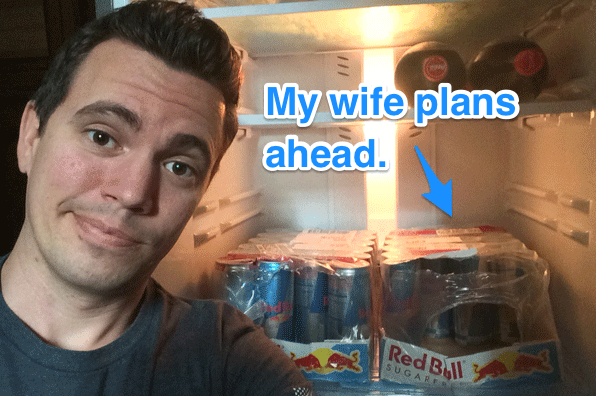
Today’s guest post is by Dave Chesson (@DaveChesson) of Kindlepreneur.
The more educated a customer is about a product, the more they’ll understand what they are looking for—and therefore be more likely to buy it.
Imagine a reader who thinks they like science fiction books, as compared to one that can specifically tell you they love sci-fi military space marine adventures. The latter is more likely to know what they are looking for and quicker to buy the book when they see it.
While more people may type “science fiction” into Amazon’s search box, there is more money being made (per search) for the phrase “sci-fi military” and even more for “space marine adventures.”

Readers start their journey in a very broad sense, and over time, as they gain experience and understand more about what they are looking for, they refine their searches. By understanding the awareness level of a reader, we can better position our books or better craft content on our author websites that not only brings in more potential readers, but helps convert them into long-term fans. This all begins with the understanding of the five levels of awareness.
The Five Levels of Awareness: A Buyer’s Path to Success
In 1966, Eugene Schwartz, a renowned advertising specialist, described the buyer’s journey using the five levels of Awareness in his book Breakthrough Advertising.
These 5 levels are:
- Unaware: People who don’t know there is a better way.
- Problem aware: Aware of the problem, unaware of the solutions.
- Solution aware: Aware of solutions in general, not yours specifically.
- Product aware: Aware of your product, but haven’t bought it.
- Most aware: Your best customers. Brand loyal.
A modern day example of this would be if someone overheard how a food delivery service made someone’s life easier (unaware). So, they do a search for “how to get any food delivered” (problem aware) and they find this article. As they research more, and progress through the stages of awareness, they discover that smoothie delivery services exist—something they love. Now, they just need to figure out which smoothie delivery service to use (most aware), so they read this article.
Which article do you think made the sale in the end? The second one, right? So, how can this be useful to an author?
Using Eugene’s Principles in Book Sales
When readers go to Amazon to find their next book, they start by typing something into the search box. Upon doing this, Amazon presents to them list of books.
However, if the reader types something very broad like “self-help” or “fantasy” do you really think Amazon will be able to show the perfect match? Probably not. Instead we are witnessing a reader who is probably in Eugene’s “problem aware” or “solution aware” level.
It is for this reason that even though broad keywords for your book might get lots of traffic, they are very competitive and also not at the “most aware” level—thus they are less likely to actually land the sale.
To illustrate this, here is a nonfiction and fiction example.


As you can see, even though the broad keyword gets more searches, they are both more competitive and have worse conversion (fewer sales as a percentage of searches). However, as we niche down, the long-tail keywords have better conversion and less competition.
So, when you do your keyword research, you want accurate, long-tail keywords that still get traffic. To learn more about this, check this article out if you write fiction, and this one if you write nonfiction.
Using Eugene’s Principles in Author Websites
A lot of authors have websites but don’t know what to write about. Eugene’s awareness levels can help.
While it’s fun to write about what you’re doing, writing, or thinking about, this only helps if we already have fans reading your stuff and care to know about your comings and goings in the author world.
If you’re like many, and don’t already have a bunch of raving fans, here are two article types any author of both fiction and nonfiction can write about that meets Eugene’s Most Aware level in style.
The Power of Lists and Your Favorite Things
We all have a list of favorites. It could be a list of your favorite books or a list of your favorite writing places. The point is, lists are a beautiful thing so long as you aren’t broad.
Like our discussion on long-tail keywords above, writing about a “List of your favorite books” resides in the unaware level territory. However, writing about your “List of favorite Victorian era romance novels” or your “List of Best Nanotech Fiction books” can really win the day.
Here are examples of authors using this method and reaping the benefits:
- Jane’s own list of best books on writing
- Top sci-fi books created a list of books like Ready Player One
- Casey Calouette listed the best science fiction weapons ever
- Self Publishing School listed their favorite nonfiction writing prompts
- AMZ Prof listed the best lights for reading
- A test prep site listed their favorite study guides
- Early Bird Books wrote about the 5 scariest vampires in literature
Using a site like SimilarWeb.com or Ahrefs.com, it’s easy to see that those articles are one of the best traffic generating articles on their entire sites. So, ask yourself, what list can you start writing?
Writing Review Articles
Lists are wondering things. Reviews are even better. Not sure what to review? Here are a few ideas:
- Review of a favorite book in your genre
- Review your favorite tool or software
- Review conferences you’ve been to
- Review your favorite writing or publishing training you’ve taken
- Review the products you use—like coffee, Red Bull, or wine or any other author necessity

An example of this in action was a review I wrote on ProWritingAid. I didn’t write about a mistake I had (unaware) or why an author needs an editing software (problem aware). Instead I focused on the “most aware” stage: it is a review of a particular product and even offers a major discount for readers. However, because this was for my readers, I ensured it covered bits of the other levels so that someone new could follow along.
Parting advice
Eugene Schwartz illustrated the importance of getting our content or product displayed in the “most aware” levels. This doesn’t negate the importance of the other levels. However, it does go to show the importance of things like specific long-tail keywords, and the end state of a buyer’s mentality. Using these principles we can get our books in front of the reader who is ready to buy, and our content in front of the right person who’s truly self aware about what they want.

Hi, I’m Dave Chesson, and when I’m not chasing little Jedi around the house, I run Kindlepreneur.com, a website devoted to the technical side of book marketing. I love digging deep and analyzing the latest book writing tools and tactics of the trade. I’m also the creator of KDP Rocket, a software that helps to peel back the curtain on Amazon and see the wizard (or book data) behind it.

This is brilliant, Dave! Thanks for sharing. So much more useful than any broad-stroked “do X and Y to get more traffic” article. Looking forward to putting this to work in with my blog and website.
Thanks Susan! Yeah, it took me weeks to really put this together and flesh it out. It’s like I knew what I wanted to say, but couldn’t make it concrete and to the point. Makes my day to see that you got that out of that struggle…haha.
Great insights on going deeper with keywords — very well explained. Thanks.
Thanks Thad! It took awhile to get my thoughts together but I’m glad I took the extra time to make sure it made sense.
I have avoided the List article, mostly because they seem so overdone and I kind of hate them because of that. I suppose I could write a list article without use the list format. Would that negate the benefits?
You could – but do remember the mentality of the person who types in things like “best” or “list of”…they’re expecting to see a list of things.
Yep. I am a big consumer of ebooks off Amazon. Searching those broad categories like science fiction or fantasy turn up way too many books with muscular shirtless men on the cover. (not that there’s anything wrong with that, just not what I am looking for) +1 on getting authors to use better more targeted keyword descriptors.
Also, I did not know about the https://topscifibooks.com/ website. Definitely going to check that site out.
hahaha….I know what you mean. Glad you liked it.
Hi Dave,
Thank you for your advice! This is brilliant. I have read other resources about keywords but reading your article helped me to articulate and understand what it really means to use the right keyword phrases. I look forward to reading more articles you have especially if you offer any advice about memoirs, those that tell stories about non-American born girls, from other parts of the world. My memoir will be published in early spring 2019. I’d love to use KDP Rocket as well as your advice.
Thank you so much for sharing your knowledge and experience!
Awesome and glad you liked it. As for memoirs, I think the best tactic for those is using Amazon Ads. When it comes to memoirs, people rarely (subjectively speaking) sit down adn say “I want to read a memoir about (insert memoir topic here). In truth, most of the time, we’re shopping and we see an interesting cover that triggers a memory or thought.
[…] Keywords are important for discoverability, but how do you pick the right words? David Kudler discusses his latest experiments with keywords and Amazon metadata, Brad Borkan explains how lateral thinking boosts keyword success, and Dave Chesson examines how your reader’s level of awareness influences keywords and fanbase growth. […]
Urgh… my brain is mashed now. Need more tea.
Take-aways are:
1) aim for the top 5 in your niche
2) I seem to be space opera
Or, better yet – you don’t have to change what you want to write – that’s not my goal with this. It’s only to show that niche’ing down on your terms can actually provide better results.